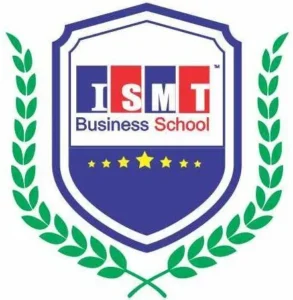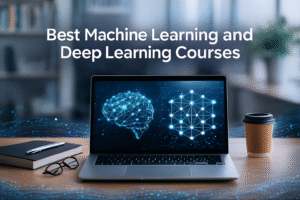1) Why learn ML & DL now
Companies across industries are embedding best machine learning and deep learning courses into products and operations — not just big tech but finance, healthcare, retail and manufacturing. Global reports show continued strong demand for AI skills and rising adoption of AI tools by organizations, which translates into more hiring and new roles for people who can build and deploy models.
In short: learn the fundamentals (probability, linear algebra, Python), then move quickly to project work that ends with a deployed model or portfolio-ready project.
2) What makes the best machine learning and deep learning courses — a practical checklist
When assessing any course, score it against these practical criteria:
- Project-first approach: end-to-end projects (data → model → production-ready demo).
- Frameworks & tooling: real experience with PyTorch or TensorFlow, plus Git, Docker and simple deployment (Flask/FastAPI).
- Instructor credibility + curriculum currency: instructors with real-world ML experience and up-to-date modules (transformers, transfer learning, MLOps basics).
- Computer vision & domain modules (if you want CV): hands-on detection/segmentation projects, pretrained model fine-tuning.
- Mentorship & reviews: code reviews, assignment feedback, and career guidance.
- Compute access: GPU support for training or clear instructions to run locally/cloud.
- Placement or real-company projects: internships, hiring partners or capstone with external stakeholders.
- Assessment & certificate: credible certificate plus a public project you can share.
If a course misses three or more of these, be cautious — theory-only courses are useful early on, but you need projects for hiring.
3) Top course types and where they shine
- Short practical bootcamps (4–12 weeks) — best for focused skill boosts (e.g., get comfortable with PyTorch, build a 2–3 project portfolio).
- Specializations / multi-course programs (2–6 months) — combine theory and projects; good for a systematic skill build.
- University courses (self-study or for credit) — rigorous theory and research exposure; excellent if you plan R&D or want a strong academic foundation.
- Free self-study tracks (fast.ai, CS231n materials) — great when paired with disciplined project work.
Different goals need different formats: choose bootcamps or specializations for faster job-readiness; choose university or research courses if aiming for research or advanced roles.
4) Recommended courses & pathways
Below are commonly recommended options across levels and domains; use them as anchors while you match them to the checklist above.
- Beginner → Practical
- Machine Learning (Coursera) by Andrew Ng — excellent intro to core concepts (supervised learning, regression, classification), ideal to start. (good for foundations; add hands-on projects).
(Note: follow up with coding projects after finishing.)
- Focused deep learning specializations
- DeepLearning.AI Specializations — structured series focused on neural networks, CNNs, sequence models and production ML. Great mix of theory + assignments.
- Computer vision — modelled for real problems
- Stanford CS231n: Deep Learning for Computer Vision — one of the most respected computer vision deep learning courses; excellent for image classification, detection and modern CV techniques. If your goal is a computer vision deep learning course, CS231n is a top reference and has free lecture videos and materials.
- Coursera & Roboflow modules (practical detection pipelines) — helpful for applied CV tasks with modern tools and hosted datasets.
- Deep, research-grade & advanced
- University programs (MIT, NYU, Stanford advanced courses) — deep mathematics and research projects; choose these if you want to push towards research or advanced engineering.
- Project-based fast track
- fast.ai Practical Deep Learning for Coders — project heavy, practical, and free; excellent for rapid prototyping and production-focused thinking.
Notes: industry roundup sites rank these consistently as top options; look for current syllabi and versions before enrolling.
5) How to pick the right course for you — a simple roadmap
- Beginner with limited math/programming: start with Andrew Ng’s ML (Coursera) + Python basics.
- Comfortable with Python + linear algebra: choose a DeepLearning.AI specialization or fast.ai and do 3 portfolio projects.
- Want computer vision specifically: take CS231n (or Coursera CV specialization) and build detection/segmentation projects; include one applied industry dataset.
- Want jobs in India (Mumbai focus): combine a recognized certificate + a capstone and job-ready interview prep (algorithms, ML system design). Glassdoor and local salary data show strong roles in Mumbai — combine practical projects with networking to increase placement chances.
6) What outcomes to expect (jobs, salaries, portfolio)
- Typical roles: Machine Learning Engineer, Deep Learning Engineer, Computer Vision Engineer, Data Scientist, MLOps Engineer.
- Typical Mumbai salary range (practical guide): recent market snapshots show machine learning engineers in Mumbai reporting average packages roughly in the ₹9–12 lakh per year band, with senior or specialized roles earning considerably more. (Use local placement support and solid projects to push toward higher percentiles.)
Real outcome depends on: level of project work, interview prep, domain expertise (CV, NLP, recommender systems), and networking.
7) How ISMT Business School fits (location & contact)
If you’re in Mumbai and want in-person guidance, bridging theory and placements can be faster with a local, industry-aligned program.
ISMT Business School — Opp. Arunkumar Vaidya Ground, Next to Old MHB Colony Bus Stop, Old MHB Colony, 3 min from Don Bosco Signal, Gorai Road, Borivali-West, Mumbai-91.
Website: www.ismtindia.com
Contact: +91-9930526101 , +91-8976055540
Why consider an on-site program at ISMT:
- Local classroom mentoring and peer projects.
- Easier access to placement help and networking with Mumbai companies.
- Ability to work on locally relevant capstones and prepare for interviews with hands-on mock rounds.
(If you want, I can convert this guide into a landing page or syllabus layout tailored to ISMT’s offerings and SEO needs.)
8) Helpful enhancements
- 30-day learning checklist (starter): Week 1—Python & linear algebra refresh; Week 2—build a small classification model; Week 3—learn PyTorch/TensorFlow and transfer learning; Week 4—deploy a simple API and prepare a README + video demo.
- Portfolio must-haves (3 projects): 1) Tabular ML end-to-end, 2) best machine learning and deep learning courses project with transfer learning and deployment, 3) An ML pipeline (data ingestion → model → simple monitoring).
- Syllabus snapshot (example): 1) Math & stats refresher, 2) Supervised learning, 3) Neural networks & CNNs, 4) Sequence models & transformers, 5) Computer vision module, 6) MLOps basics + deployment.
Free starter resources: Andrew Ng (Coursera), CS231n lecture videos, fast.ai practical course, DeepLearning.AI intro modules.
9) FAQ
Q: Which is the single best course for a beginner?
Q: I want a career in computer vision — which course?
Q: How long until I’m job-ready?
Q: Will online certificates get me hired?
Q: Can I learn ML/DL for free?
Closing summary
For anyone searching for the best machine learning and deep learning courses, focus on programs that combine theory, modern frameworks, and real deployment projects. If you’re in Mumbai and want classroom mentorship with placement support, explore ISMT Business School’s programs and book a counselling session via www.ismtindia.com — bring your laptop, your strongest problem statement, and a project idea; a guided capstone will make the difference.
9) Author & review box
Author: Senior AI Instructor — 10 years experience building ML systems and mentoring engineers (course authoring and placement-focused training).
Reviewed by: ISMT Academic Review Panel.
Organization: ISMT Business School
Address: Opp. Arunkumar Vaidya Ground, Next to Old MHB Colony Bus Stop, Old MHB Colony, 3 min from Don Bosco Signal, Gorai Road, Borivali-West, Mumbai-91.
Website: www.ismtindia.com





